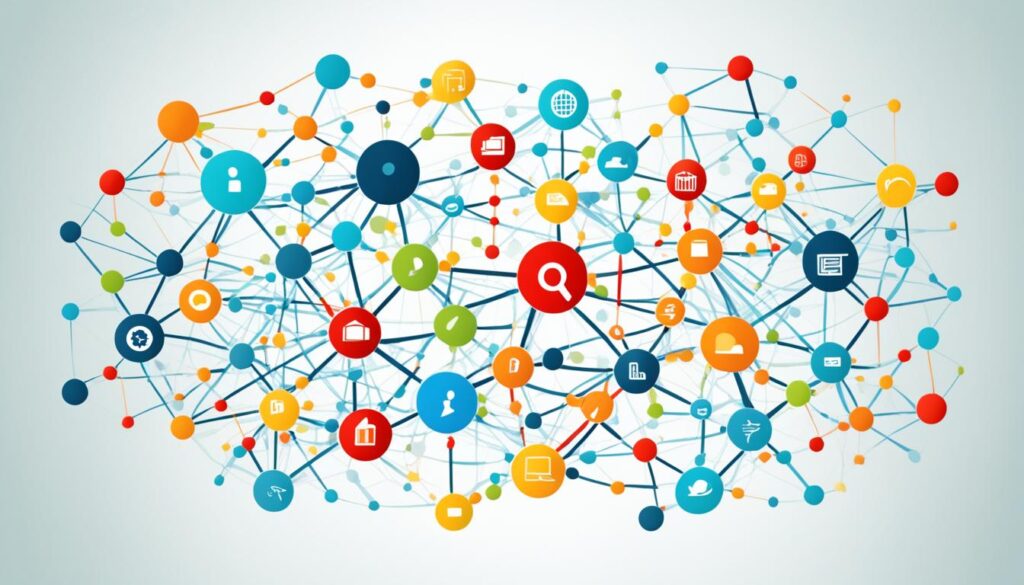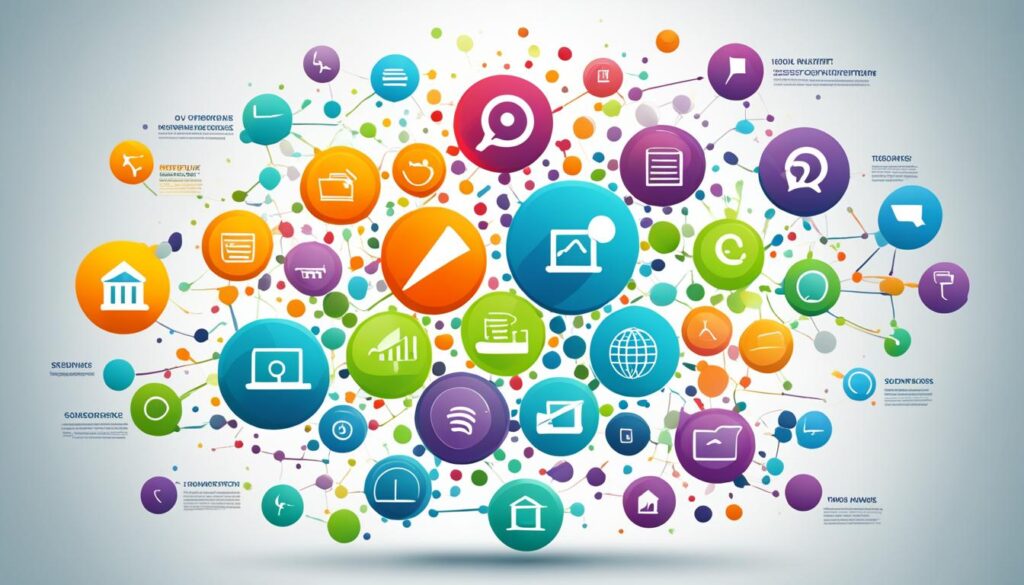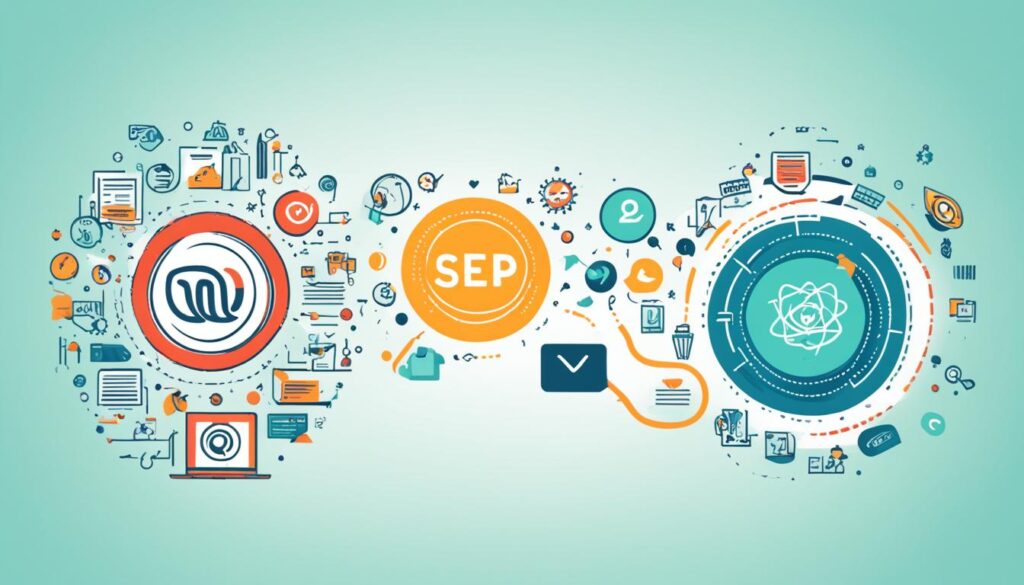
According to the famous marketer Seth Godin, “The internet is the first thing that humanity has built that humanity doesn’t understand, the largest experiment in anarchy that we have ever had.” The internet has completely changed marketing. It has given us new ways and challenges to attract and engage our target audience.
Today, more than 4.95 billion people across the globe use the internet. This makes it a powerful tool for businesses. It offers unique advantages that traditional advertising, such as TV and print, can’t match. We can reach more people, personalize content, and build lasting customer relationships easily.
Are you aiming to increase website traffic generation, improve online sales tactics, or refine your search engine optimization (SEO), pay-per-click (PPC) advertising, social media marketing, email marketing campaigns, content marketing, or conversion rate optimization? Internet marketing is key. It involves planning and executing strategies to succeed online. We will go through essential tips and strategies to create campaigns that get real results.
The Rise of Internet Marketing
The internet is now a key place for marketing and advertising. More than 4.95 billion people use it. This number shows the endless opportunities for businesses online. Marketing through the internet is essential today. It brings new benefits that TV and print cannot.
Internet Usage Statistics
The number of internet users has doubled in the last ten years. Now, over 60% of the world is online. This huge digital space lets companies meet their customers and sell. It’s a chance to make brand names known and attract sales.
Benefits of Internet Marketing
Internet marketing is better than old ways in many areas. It lets businesses reach people all over the world. It also helps send the right message to the right people at the right time. But, what’s really special is how it builds strong customer relationships. This is key for loyalty and more sales.

| Benefit | Description |
|---|---|
| Scope of Reach | Internet marketing allows businesses to connect with customers across the globe, expanding their potential customer base exponentially. |
| Personalization of Content | Internet marketing enables businesses to tailor their messaging and content to specific target audiences, ensuring relevance and engagement. |
| Relationship Building | Internet marketing facilitates the development of long-lasting, meaningful relationships with customers, fostering loyalty and repeat business. |
Understanding Internet Marketing
Internet marketing uses the internet to reach customers. It involves sending messages through digital channels. These include search engines, emails, sites, and social media. This strategy helps businesses meet their audience and achieve outcomes like more brand awareness and sales.
Definition of Internet Marketing
Digital marketing uses online methods to sell products. It includes SEO, PPC, social media, and more. The aim is to draw in, interest, and make digital customers buy.
Types of Internet Marketing
Internet marketing uses various methods to meet its goals. Common ways include:
- Search Engine Optimization (SEO): Improving a website to show up more in search results without paying for ads.
- Pay-Per-Click (PPC) Advertising: Advertisers pay when someone clicks their ad, making campaigns targetable and measurable.
- Social Media Marketing: Using platforms like Facebook and Instagram to grow awareness, interact with customers, and boost site visits.
- Email Marketing: Sending personalized emails to subscribers to promote things.
- Content Marketing: Creating valuable content to engage and keep a clear audience, leading to sales.
Using these strategies well helps businesses online. It helps them find their audience and meet their marketing targets.

The Role of Internet Marketing
The main goal of internet marketing is to help businesses connect with people online. Taking digital marketing courses can teach you what you need to know. It’s a big step in learning how to reach, attract, and convert online customers.
Attracting New Customers
The web opens up a world of potential customers for businesses. With smart ways like SEO, targeted ads, and a lively social media, companies reach out. They make themselves known to new audiences and boost their brand.
Sharing valuable, personalized content hooks potential customers. It makes them eager to check out what you offer.
Cultivating Brand Loyalists
Internet marketing isn’t just about finding new customers. It’s also about keeping them coming back. By sending engaging emails, being active on social media, and offering great online experiences, companies build loyalty.
This loyalty leads to repeat business and recommendations to others. So, a consistent online presence helps grow and improve a company’s reputation.
Others also read this article : Digital Advertising Trends: The Future to Watch
Internet Marketing vs. Content Marketing
Content marketing and internet marketing are both key in drawing people to your site. They help turn visitors into customers. Despite their similarities, they have some differences.
| Internet Marketing | Content Marketing |
|---|---|
| Focuses on driving traffic to your website or landing page through various digital channels such as search engine optimization (SEO), pay-per-click (PPC) advertising, and social media marketing. | Emphasizes creating and distributing valuable, relevant, and consistent content to attract and retain a clearly defined audience, with the ultimate goal of driving profitable customer action. |
| Typically aims to generate immediate sales or conversions, often through direct response tactics. | Focuses on building long-term relationships and trust with the audience, with the expectation of future sales and loyalty. |
| Relies heavily on data and analytics to measure and optimize campaign performance. | Places a strong emphasis on creating high-quality, engaging content that provides value to the target audience. |
Even though both strategies are necessary, knowing the differences helps create a stronger marketing plan. This approach is more successful in engaging and converting the audience you aim for.

How to plan internet marketing? Ways to get traffic and sales
Creating a strong internet marketing plan is key for businesses today. It helps them connect with their customers online. To boost your web traffic and sales, there are some important steps to take.
Define Your Target Audience
The first step is to know who you’re marketing to. Create detailed profiles of your perfect customers. Include info like what they like, what they need, and how they shop. Knowing your audience helps you tailor your message and products for them.
Establish Clear Marketing Goals
Set goals that are specific and can be measured. These goals should match what your business is trying to achieve. They could be about getting your name out there, bringing more people to your site, growing your leads, or selling more. Clear goals keep your marketing on track.
Develop a Content Strategy
Building a strong content plan is crucial for connecting with and converting your audience. Figure out what type of content will interest your audience most. Then, set a schedule to make sure they keep coming back for more.
Leverage Multiple Digital Channels
Use a mix of online tools to spread your message. This could mean working on your website’s SEO, being active on social media, sending out emails, and online ads. By using all of these together, you can make a real impact.
Digital Marketing Strategies and Tactics
Businesses keep up with the changing digital world by using many strategies and tactics. They need to in order to be successful. These include
Search Engine Optimization (SEO)
,
Social Media Marketing
,
Email Marketing
, and
Pay-Per-Click (PPC) Advertising
. Each of these methods has its own benefits for reaching and involving your target audience.
Search Engine Optimization (SEO)
SEO is about making your company more visible in search results without paying for ads. It ensures your website shows up when people look for what you offer. With good SEO, you can appear more often in search results. This brings more people to your site.
Social Media Marketing
Social media is key for talking directly to your audience, making your brand known, and building customer relationships. Having a strong social media presence and working with influencers can make your social media efforts pay off.
Email Marketing
Emails are still a great way to keep in touch with leads and customers. Sending personalized and valuable emails can boost your business. They remind your audience of your brand and get them to take action.
Pay-Per-Click (PPC) Advertising
With PPC ads on Google and social media, you can target the people most likely to be interested in your products. Making your ads and strategies better can boost their effectiveness. This helps get more results from your ad money.
Others also read this article : Create Viral Content: Content Marketing Hacks
Measuring and Optimizing Campaigns
Measuring how well your digital marketing works is key. This helps you make smart choices and get better over time. Using the right Key Performance Indicators (KPIs) and tools like analytics and A/B testing gives you important info. This info helps you tweak your marketing to meet your goals.
Key Performance Indicators (KPIs)
Picking the right KPIs is crucial for seeing if your online marketing is hitting the mark. You might look at website visits, how many people take actions on your site, emails that get opened, social media success, and how much money you make from your efforts. Keeping track of these and regularly checking them lets you know what needs fixing and what’s working.
Analytics and Data Visualization
Tools like Google Analytics offer a deep look at what your marketing data is doing. They show things like what your users do on your site, how they found it, and what content they like best. Translating this data into easy-to-understand graphs and charts helps you see what works and what doesn’t. It guides you to make choices based on real numbers.
A/B Testing and Optimization
Always improving your marketing is vital to get the most out of it. A/B testing lets you see what small changes can do. For example, you can test two versions of a page or email to see which one does better. This method helps you pick what truly works and makes your marketing efforts stronger.
Best Practices for Marketing Campaign Planning
To make an effective marketing campaign, you need a strategy that meets your business goals. These best practices enhance the success of your digital marketing and yield solid outcomes.
Start with Clear Objectives
Every good marketing campaign has a precise goal. This could be to boost brand recognition, increase sales, or introduce a new item. The first step is to make sure your aims fit with your bigger business goals and are SMART: Specific, Measurable, Achievable, Relevant, and Time-bound.
Understand Your Audience
Knowing your audience well is key. Do deep market research to create specific buyer personas. Understand their demographics, what they struggle with, what they like, and how they act. This info shapes your messages, where you promote, and your marketing plan overall.
Leverage Cross-Channel Integration
Consumers now connect with brands in many ways digitally. To make the most of this, blend your marketing efforts across various platforms like search, social media, email, and your site. This approach gives a unified, custom feel, boosting brand recognition and sales.
Focus on Content Quality
Quality content is fundamental to any marketing strategy. Make content that’s helpful, interesting, and looks good. Use different types like blogs, videos, and social media to catch attention and earn trust.
Measure, Learn, and Adapt
It’s crucial to always check how your campaigns are doing. Look at metrics such as website visits, leads, and sales. Find ways to make things better based on what the data tells you. This keeps your marketing up to date and successful.
Conclusion
Your role in planning marketing campaigns is key. Start with clear goals and deeply know your audience. Use multiple channels, focus on great content, and always measure and adapt. Doing this helps your campaigns succeed.
The best campaigns meet their goals and really speak to the audience. They create strong, lasting connections and help the business grow.
To market effectively online, use many digital strategies. This includes SEO, social media, and email marketing. Your strategy should match your business goals and speak to your customers.
It’s important to set clear goals, understand your audience, and always improve. This ensures your online marketing actually works and brings success to your company. Keep in mind, the online world is always changing. So, being ready to adapt and using data wisely are crucial for the future.





